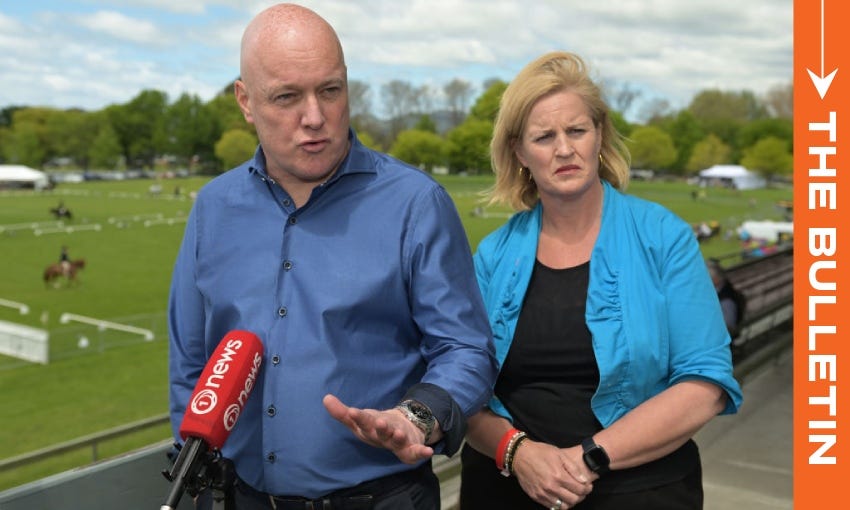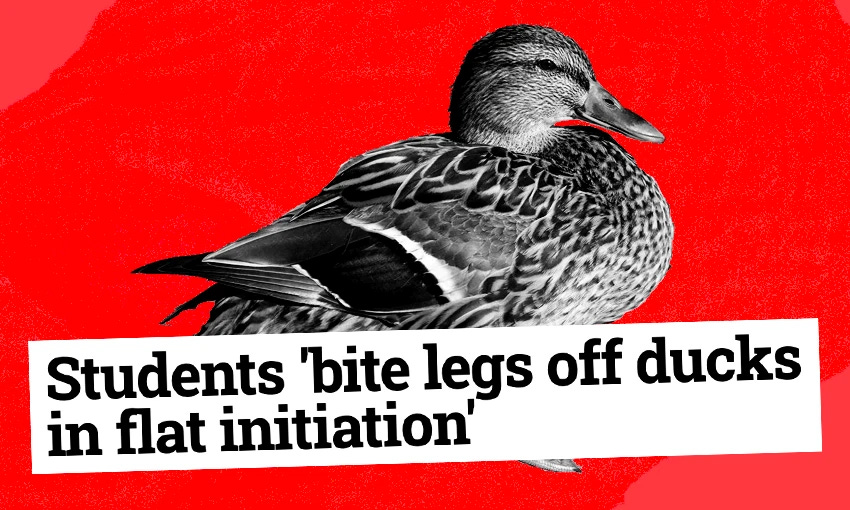National treads familiar territory with welfare ‘reset’ signalling
A return to a stricter regime of sanctions for those on the unemployment benefit has been described as 'political theatre' and 'building a legacy of cruelty'
Mōrena, and welcome to The Bulletin for Tuesday, February 20, written by Anna Rawhiti-Connell.
In today’s edition: Hipkins sustains post-election drop in preferred prime minister stakes; plan to scrap Māori Health Authority to be investigated by Waitangi Tribunal; questions grow about Cook Straight ferry costings; but first, the tough love continues as government signals welfare ‘reset’
Welfare system ‘reset’ signalled
Yesterday, prime minister Christopher Luxon and social development minister Louise Upston announced a return to a stricter regime of sanctions for those on the unemployment benefit. Luxon said he’s seen enough evidence to prove the use of sanctions should be ramped up to get more people off the benefit. The announcement isn’t really new news, with the National Party pledging to introduce more sanctions for unemployed beneficiaries who “persistently” do not meet benefit obligations in September last year. The sanctions in question already exist. Yesterday’s announcement was signalling, with Upston telling Checkpoint as much. The announcement signalled a “reset” of the welfare system, she said. It was also flagged in Luxon’s State of the Nation speech on Sunday. “We’ll do everything we can to help people into work, but if they don’t play ball the free ride is over,” he said.
‘Out of touch’ and ‘building a legacy of cruelty’
Labour and the Greens have come out in opposition. Carmel Sepuloni, Labour’s social development spokeswoman, said the announcement was “unfair” and “out of touch”, criticising Luxon for speaking down to beneficiaries by assuming jobseekers didn’t want to work. Green party social development spokesman Ricardo Menéndez March said the Government was quickly building a legacy of cruelty. “Now, today, we have yet another measure to penalise the poorest people. It is a symptom of the politics of cruelty that is driving this coalition’s policies and steering New Zealand backwards.”
Yesterday’s directive a holding pattern
As noted above, these sanctions already exist. Following the release of the Welfare Expert Advisory Group (WEAG) recommendations in 2019, which recommended a range of sanctions be removed, Labour retained the sanctions relating to job-seeking. The reduction in the number of people having sanctions applied was put down to a change in culture at the Ministry of Social Development and evidence they didn’t work by Sepuloni, who was social development minister at the time. As Michael Neilson reported back in September when National’s policy was announced, “there were about 12,000 sanctions applied to people on Jobseeker benefits in the quarter before Labour came into Government in 2017. This remained relatively steady until the beginning of the pandemic, when they plummeted as the Ministry of Social Development adopted a much-less punitive approach. Sanctions have increased since the end of 2020, with the latest June quarter at 6243 - roughly half the number under National.” As Newshub reports, National campaigned on a “traffic light system” policy, but in the letter Upston sent to MSD’s chief executive, Upston said this will take some time to develop. “In advance of that substantive piece, it is my expectation that the Ministry apply the obligations and sanctions that already exist,” she said.
‘More about pure political theatre than substance’
In assessing yesterday’s announcement, the Herald’s Claire Trevett also notes (paywalled) that yesterday’s “announcement” wasn’t new news and is a stop-gap measure “more about pure political theatre than the substance of the move.” “Talking tough about the unemployed is almost always good politics for a National party leader and Luxon does it well,” she writes. The Herald’s Simon Wilson notes (paywalled) “Luxon’s ‘tough love’ speech was very well received by the party faithful,” but “if Luxon really wanted to present us with courage and leadership in these fragile times, he’d stop telling his supporters what they want to hear. His straight-talking would include asking them to share the burden.” Wilson describes benefit sanctions as the“peculiar desire to punish” that “do not work and are especially hard on children.” In February last year, the Ministry of Social Development acknowledged sanctions “do result in a reduction in household income” and that “in some cases this can affect children”.
Give support, get great journalism
Since the start of the year, Spinoff readers have helped fund some of our most popular and important work including our newly launched editorial series The War for Wellington, coverage of Waitangi Day, te Tiriti explainers, an investigation into the rise and fall of a popular Auckland restaurant, fresh episodes of Gone by Lunchtime and more.
Whether you read, listen to or watch our mahi, you can support us to do more by donating today or signing up to become a Spinoff member.
Polling results on par with election night, Hipkins sustains post-election drop in preferred prime minister stakes
Last night’s 1News Verian poll delivered a 10% drop for Labour leader Chris Hipkins in preferred prime minister polling, down from 25% to 15% on the last poll. Prime minister Christopher Luxon held steady at 25%. Apples and oranges, polls and polls, but for a bit of context, National leader Bill English’s preferred prime minister polling in the first polls after the 2017 election wasn’t catastrophic. He’d dropped from 32% to 28% in a December 2017 1News poll, but by February 19 2018, he had dropped another 8 points to 20%. Jacinda Ardern was up 4 points on 41%. English resigned as National party leader six days before that poll was released. Hipkins says the point at which he should resign as leader was “certainly not something that I’m contemplating”. For whoever is waiting in the Labour leadership wings, less time wandering in the inevitable, post-election defeat wilderness might be desirable. Party poll numbers looked, as Toby Manhire writes this morning, “strikingly similar to the election night result.” He offers some observations on why. He also suggests that in the wake of the Curia/TPU poll last week, which had Act on 13.7%, the party’s average across the four post-election polls suggests the need to take a breath on ascribing meaning to the noise around Act’s Treaty stance.
Plan to scrap Māori Health Authority to be investigated by Waitangi Tribunal
As the Herald’s Joseph Los'e reported last night, the government will be informed today that its plans to scrap the Te Te Aka Whai Ora, the Māori Health Authority, will be formally investigated by the Waitangi Tribunal. The hearing, which the government opposed, is set for Thursday and Friday next week, February 29 and March 1. Scrapping Te Aka Whai Ora is listed as an item in the 100-day plan, and the government is expected to introduce legislation to scrap the Authority in the coming weeks. Lady Tureiti Moxon, chair of the National Urban Māori Authority, and Janice Kuka, the managing director of Māori primary health organisation (PHO) Ngā Mataapuna Oranga requested an urgent hearing regarding the government's plans on 8 December.
Catch up on our Sunday essay series, including Maddie Holden’s latest on reckoning with post-natal depression, intrusive thoughts and being a new mother.
Click and Collect
The costings used as justification for Nicola Willis’s cancellation of the Cook Straight ferry project are being questioned.
More than 9000 New Zealand nurses have registered to work in Australia in the past 10 months.
Shane Jones criticised over attack on Supreme Court ruling.
Low turnout in council byelections strikes again. Only 22% of eligible voters in the recent Hamilton byelection voted, and former National MP Tim McIndoe looks to have a clear win.
‘Dust is everywhere’: a rare glimpse of how Michelangelo’s David is kept clean.
Feeling clever? Click here to play 1Q, Aotearoa’s newest, shortest daily quiz.
Fox Meyer continues his investigation of university hazing rituals, asking what happens when these kinds of activities end up in the news. We have a guide to what to watch on streaming services this week. Eleanor West argues that demolishing character homes can be good for the environment. Gabi Lardies asks whether AI can help with existential crises and romantic relationships. Shanti Mathias explains a new member's bill that aims to stop landlords from getting extra votes in local elections.
Sporting snippets
The Football Ferns are off to the Paris Olympics following an 11-1 win over the Solomon Islands in a qualifying match yesterday.
The Herald’s Chris Rattue rages against the Halberg Awards (paywalled).
Controversy in the Australian equestrian scene over a mankini. A warning for those sensitive to images of mankini-wearing: that link comes with an image of a man wearing the mankini in question. Personally, I admire his bravery; the mankini wearer (and Olympic medalist) did so while riding a horse.
Got some feedback about The Bulletin, or anything in the news? Get in touch with me at thebulletin@thespinoff.co.nz.
If you liked what you read today, share The Bulletin with friends, family and colleagues.












None of the (non-paywalled) articles about benefit sanctions appears to link this to Reserve Bank actions. It's absurb and immoral that National are being allowed to make claims about the need for sanctions to get more people into work, when the Reserve Bank of New Zealand are deliberately trying to push the unemployment rate higher to reduce inflation.
There's an old dad joke about the dyslexic devil worshiper who sold his soul to Santa.
What we have here is a dysfunctional management worshiper who sold his soul to Seymour.